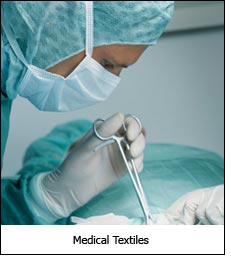Interviews
'Spinning new strategy on technical textiles a must' – Dr Ramkumar
09 Jul '09
10 min read

Medical Textiles
“Under the circumstances, the Indian industry should, first and foremost, categorically understand that technical textiles are not limited to woven fabrics and nonwoven materials alone. Technical textiles sector is a broad based industry and encompasses fiber to fabric and fabric to finished goods. Technical textiles can be high performance fibers, yarns, woven, knitted, nonwovens and composite materials.
“Technical textiles materials are not banal fabrics but are fully finished end-use products such as packaged wipes, finished diapers, finished geotextiles and even functional finished apparel materials. The most important message for the Indian textile industry is that the conversion of fabrics and yarns to high-tech products is the gateway for the next phase of the textile industry. In other words, attention has to be focused immediately to create a converting sector within the technical textiles industry.
“The converting sector will consist of small and medium scale enterprises that convert roll goods to useful products such as diapers, wipes, medical fabrics, molded automotive components such as boot liners, oil filters, etc. In addition to the existing theoretical and technical know how, it is of utmost importance to infuse marketing ideas. Government of India and all stakeholders have to take these points to their hearts and create platforms for hooking-up with international trade bodies so that information on markets are available to the existing emerging entrepreneurs in the technical textiles field.
“To give an example, according to the USA based Industrial Fabrics Association International (IFAI), the world market for industrial textiles in 2010 is 120 billion dollars. Currently, China contributes 46% to the US import market in industrial fabrics whereas India's contribution is a miniscule 7%. It is an irony that even Pakistan leads India by 1% in supplies of industrial textiles. There are a lot of opportunities to seize in specialty fabrics. It is not feasible for small and medium entrepreneurs and even large scale companies to invest in R & D.
“There should be public-private partnership to focus on mission-linked R & D and product development in technical textiles. It should be noted here that new products which are not developed by our neighboring competitors such as China, Pakistan in industrial textiles should be the frontrunners for our industry. These latest technical and market information although not readily available, can be had by having collaborations and exchanges with leading universities in the field such as the North Corolona State University, USA, Texas Tech University, USA, University of Leeds, UK, Fraunhofer Institutes in Germany, Deakin University, Australia, etc.
“In addition, it is important to think positively towards green/sustainable next-generation technical textiles industry in India. This way, India will lead China and other competingcountries in the field. India has raw material resources to kick start the technical textile base in India. Right now, India is a leader in polyester production, world's largest producer of viscose rayon and world's second largest producer of cotton. Although the existing capacity can be geared towards technical textiles sector, it is essential to develop additional raw material base that can fully satisfy the needs of the technical textiles sector.
“Technical textiles materials are not banal fabrics but are fully finished end-use products such as packaged wipes, finished diapers, finished geotextiles and even functional finished apparel materials. The most important message for the Indian textile industry is that the conversion of fabrics and yarns to high-tech products is the gateway for the next phase of the textile industry. In other words, attention has to be focused immediately to create a converting sector within the technical textiles industry.
“The converting sector will consist of small and medium scale enterprises that convert roll goods to useful products such as diapers, wipes, medical fabrics, molded automotive components such as boot liners, oil filters, etc. In addition to the existing theoretical and technical know how, it is of utmost importance to infuse marketing ideas. Government of India and all stakeholders have to take these points to their hearts and create platforms for hooking-up with international trade bodies so that information on markets are available to the existing emerging entrepreneurs in the technical textiles field.
“To give an example, according to the USA based Industrial Fabrics Association International (IFAI), the world market for industrial textiles in 2010 is 120 billion dollars. Currently, China contributes 46% to the US import market in industrial fabrics whereas India's contribution is a miniscule 7%. It is an irony that even Pakistan leads India by 1% in supplies of industrial textiles. There are a lot of opportunities to seize in specialty fabrics. It is not feasible for small and medium entrepreneurs and even large scale companies to invest in R & D.
“There should be public-private partnership to focus on mission-linked R & D and product development in technical textiles. It should be noted here that new products which are not developed by our neighboring competitors such as China, Pakistan in industrial textiles should be the frontrunners for our industry. These latest technical and market information although not readily available, can be had by having collaborations and exchanges with leading universities in the field such as the North Corolona State University, USA, Texas Tech University, USA, University of Leeds, UK, Fraunhofer Institutes in Germany, Deakin University, Australia, etc.
“In addition, it is important to think positively towards green/sustainable next-generation technical textiles industry in India. This way, India will lead China and other competingcountries in the field. India has raw material resources to kick start the technical textile base in India. Right now, India is a leader in polyester production, world's largest producer of viscose rayon and world's second largest producer of cotton. Although the existing capacity can be geared towards technical textiles sector, it is essential to develop additional raw material base that can fully satisfy the needs of the technical textiles sector.
Popular News
Leave your Comments
Editor’s Pick
































-Ltd..jpg?tr=w-120,h-60,c-at_max,cm-pad_resize,bg-ffffff)





.jpg?tr=w-120,h-60,c-at_max,cm-pad_resize,bg-ffffff)
.jpg?tr=w-120,h-60,c-at_max,cm-pad_resize,bg-ffffff)






